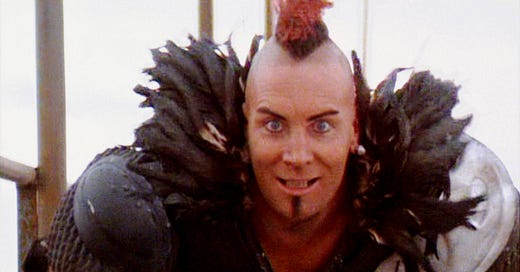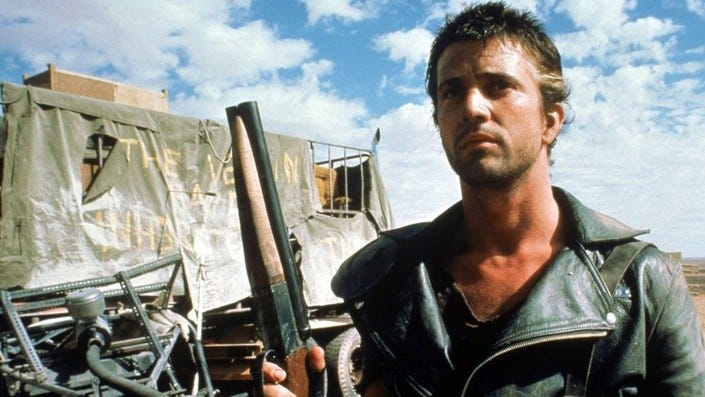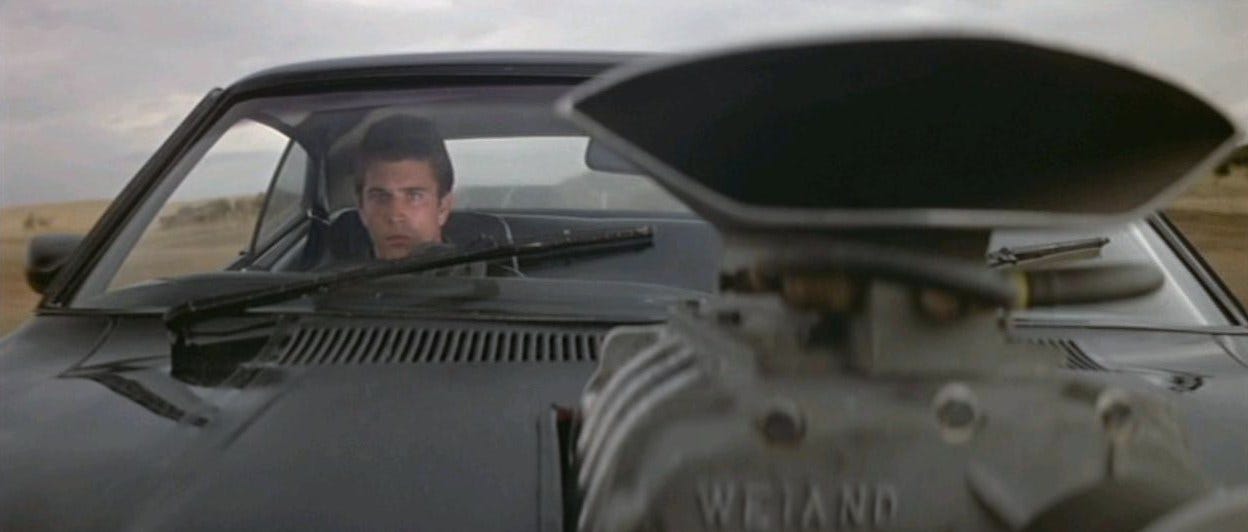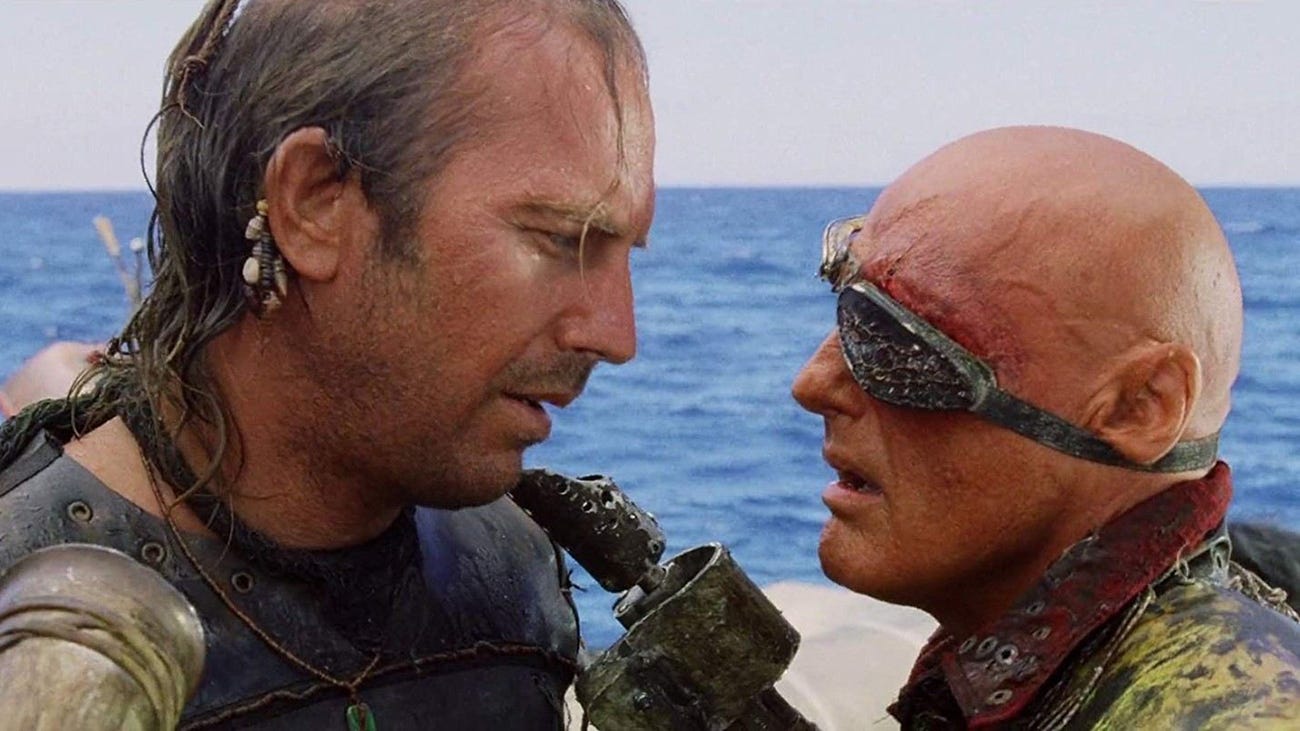The Road Warrior: A last chance power drive
A movie where gas is expensive and life is cheap. But surprise! It's not set in modern-day America.
Before we go any further this week, we have to stop right now and appreciate this dude:
Check that out. Look at this guy. Nothing says the 80s were a great goddamn time to be alive than this. This is what our antagonists looked like back then, one part metalhead and one part German anti-nuke activist. (His name was Wez, and I believe he went on to play drums for the Red Hot Chili Peppers.)
The reason we all are familiar with villains like this is because George Miller basically created a universe in the Mad Max series that has been so ripped-off, replicated, and rebooted that Miller’s influence on modern pop culture can scarcely be underestimated. These cyber/steam/biker/alien punks have been with us for so long it’s hard to imagine a cinematic world without them.
This is largely due to a modest little action film from 1982 called The Road Warrior, the sequel to the Australian film Mad Max that featured a young Mel Gibson as a vengeful ex-cop patrolling a post-apocalyptic wasteland in a souped-up V-8 cruiser. Was there any part of the last sentence fragment that wasn’t kickass?
Miller created (or at least refined) a new kinetic language, born of wheels racing down empty strips of asphalt in the middle of barren deserts and tricked-out driving machines roaring though the dirt in high-speed pursuit. (If this sounds like a Springsteen song, take note that a highway gang member in Mad Max refers to himself as a “fuel-injected suicide machine.”)
In the first film, Gibson still holds onto a sliver of humanity while there remains some semblance of order. An unspeakable and largely undescribed cataclysm has left civilization in ruins, with lawless gangs chased down highways by police in built-up muscle cars. Don’t overthink it. It’s basically just a premise to allow for max-velocity carnage, all expertly staged by Miller.
In The Road Warrior, the details begin to become filled in. Nations went to war, largely over declining resources. The cities collapsed. Fuel has become the only real currency left. Max the ex-cop is now a wanderer, rendered hollow by the loss of his family. He comes across a settlement trying to defend its fuel stores from a marauder known as “Lord Humungus.” (He is a indeed a big ‘un and served as a prototype for Bane in The Dark Knight Rises.)
I have touched on this before, but what was it about this period in cinema that made Cold War filmmakers throw their hands up and decide self-destruction was inevitable? There was a shift in tone from the 60s, which offered grave meditations on the risk of war in films such as Fail-Safe, to the 70s when a spate of post-apocalyptic works took hold such as Planet of the Apes, The Omega Man, Logan’s Run, Damnation Alley, A Boy and His Dog, through to Mad Max and Blade Runner. Perhaps the twin failures of Watergate and Vietnam persuaded Americans that they could not trust their institutions or leaders to rescue them from the nuclear predicament. At the same time, the PC revolution hadn’t yet begun so we did not consider technology as something that could alter the trajectory of our own lives beyond the military-industrial complex. These films fit with the cynicism of the times.
The Road Warrior is an exercise in high-speed, blunt force trauma, filled with vehicles hurtling down the road and at each other. Miller makes use of a vastly expanded budget that results in a film of real spectacle. There are also shots of surreal beauty, such as when Max observes vehicles leaving a makeshift refinery in the evening dusk. The added scope makes the desolation of mankind’s fate palpable and seemingly irrevocable.
And to be clear, what the movie tells us is that only scavengers survive. There are no CEOs, tech bros, influencers, lawyers – or journalists for that matter – to be found. They would have no utility in this hellscape. (I have remarked before that I would be useless if suddenly thrown into the past such as Mark Twain’s Connecticut Yankee. I would be equally unhelpful in a post-apocalyptic environment as I am lacking in even the most basic survival skills. If Max is the Road Warrior, I would be Road Kill.)
There’s something enjoyable primal about the movie. Despite the setting, it honors established Hollywood genres. Max is the lone rider, the outsider who comes to small town. Reluctantly, he agrees to protect it. He could be the hero in a Randolph Scott Western or samurai Mifune in Yojimbo. But those movies never contained the sheer popcorn-munching awesomeness of having a tricked-out muscle car ram full speed into a tractor trailer. There’s also a fair amount of cheeky humor, which its imitators have had a hard time duplicating.
Watching a film like this was reminder of how good we had it in the late 70s and early 80s. I know most people think their era was special. But growing up in central Ohio, with little to worry about except my parents’ domestic dramas, I was a lucky kid. One great film after another came to our theaters. The year 1982 alone saw movies such as E.T., 48 HRS, Star Trek II: The Wrath of Khan, Blade Runner, Poltergeist and Rocky III (among many, many others1). The previous year had seen Raiders of the Lost Ark, Superman II, An American Werewolf in London and Arthur. The Empire Strikes Back and The Blues Brothers came a year before that.
It was a wonderful time to be a dreamy young man in the suburbs, unburdened by the tyranny of the internet, social media or helicopter parents. I roamed freely, soaked up as much pop culture and sports as I could, tried to stay up late into the night and imagined worlds far beyond my own. If I couldn’t live in those worlds, maybe at least I could write about them. Or even create some one day.
But I never did that. I don’t really understand why. But I guess, in a way, I am doing it now. Who wants a Twizzler?
WHERE CAN I WATCH IT: The Road Warrior is rentable on major platforms. Mad Max is streaming on (where else?) MAX.
HEY ISN’T THAT: You’ve likely never heard of Michael Preston, a British actor who plays the leader of the encampment Max stumbles across. He ran up an impressive list of guest roles on 1980s American TV: “The A-Team,” “Scarecrow and Mrs. King,” “Airwolf” (twice!), “Hunter”, “Remington Steele” and “The Facts of Life” as the roomie who didn’t fit in.
ARMAGEDDON INDEX (10/10): It already happened, mate.
DUST CLOUDS: Over the last couple of years, I have become enamored with an Australian TV show called “Rake” about a wily lawyer with a shabby personal life and dubious ethics. Richard Roxburgh gives one of the great anti-hero turns in modern television. Seek it out if you can find it. The fifth and final season shifted gears as Roxburgh’s character, Cleaver Greene, is elected to the national Senate. The early episodes dealt with a rogue U.S. president and a whiskey-sodden Defense secretary on a visiting tour and examined Australia’s place in the world in trying to be a good ally while also looking after its own affairs in the South Pacific. I thought about this in the context of Mad Max — the price that could have been paid by nations such as Australia that were caught up in a game of mutual assured destruction during the Cold War that was not of their making and over which they had little say. Australia, of course, was a close ally of the US, for the not insiginficant reason that Communist advances were taking place on its side of the globe in Korea and Vietnam. More on this next time.
WHAT I’M WATCHING: TV: Rake (S5, Tubi), Bosch: Legacy (S3, Amazon), Mobland (S1, Paramount). Movies: The Insider (Mann, 1999), The Philadelphia Story (Cukor, 1940).
TOP OF THE POPS: The number-one song in the US when The Road Warrior was released was the song that ended racism in America: “Ebony and Ivory.”
CLASSIC CORNER: After digesting both early Mad Max movies, I realized that the experience had fortified me to watch a film I have steadfastly avoided since its release in 1995. It’s “Mad Max on the ocean” – better known as Waterworld. (Or as the press dubbed it then, “Kevin’s Gate.”) Plagued by production and budget issues and featuring Kevin Costner as a future fishman – wait, I’ve already lost you, haven’t I? – the film was a notorious disaster. I am here to tell you, dear reader, that its withering reviews were earned. It is not a work to be reappraised or rediscovered.
The story is set in a ragtag future where the land is gone, humans live only on the water, and a young girl may hold a key to mankind’s future if Costner can keep her from the clutches of an eye patch-wearing Dennis Hopper. (Read that sentence again.) Look, I have always liked Costner. He’s best as a cowboy or an athlete or you know, GM of the Cleveland Browns. He is not so good as a mutant fishman, and his character is a dull as a bilge pump. Hopper seems to think he’s playing a villain in the old “Batman” TV series, he’s so over the top. He might as well have been Cesar Romero. But here’s what annoyed me the most: Sure, The Road Warrior plays it loose with its timeline (How is there still so much gasoline?), but Waterworld suggests the planet flooded so recently that there is still whiskey, cigarettes, jetskis and an endless supply of guns and ammo. Come on. Anyone who has ever owned a jetski will tell you those things won’t last 10 years, much less 500. But enough time has also passed for humans to have mutated into fish-people. Is it scientifically possible for humans to evolve and for cases of Jack Daniel’s to still be available? Ask Chat GPT. I don’t care.
See you next time!
LAST ENTRY: One, Two, Three (1961)
NEXT ENTRY: On the Beach (1959)
1982 was a titanic movie year for more than just teens. Beyond the films mentioned above, the year gave us Tootsie, An Officer and a Gentleman, First Blood, Gandhi, Sophie’s Choice, Victor/Victoria, On Golden Pond, Fitzcarraldo, Deathtrap, Richard Pryor: Live on the Sunset Strip, Cat People, Conan the Barbarian, Diner, Dead Men Don’t Wear Plaid, The Thing, Tron, Night Shift, The World According to Garp, Fast Times at Ridgemont High, Pink Floyd - The Wall, My Favorite Year, The Verdict, and The Year of Living Dangerously (which also starred Mr. Gibson, whom we are not going to discuss here.)









I'm glad to see that you are doing On The Beach next. The book was also good. Much bleaker than Alas, Babylon. Growing up in the late 50s and 60s I had my share of post-apocalyptic books.
I don't know if I mentioned the movie Cold War (I think it is available on Prime). It is a Polish movie about relationships across the Iron Curtain. Black and White. I have a fondness for B&W films. Worth watching.
Rake was great show. If you like Aussie TV, I would also recommend Colin From Accounts and Territory (the Aussie Yellowstone, with Gordo from For All Mankind. I di not know he was Australian. Forty years ago there was a good Australian show called A Town Called Alice about returning POWs from WW2.
Yes! Formative movie of my youth. FYI: Vernon Wells spoofed his Wez character in Weird Science. https://m.media-amazon.com/images/M/MV5BMzM0MTQzMjAtMDdjYS00MmYwLTk5NGEtZWIzNmFhZjJiOWIxXkEyXkFqcGc@._V1_FMjpg_UX1000_.jpg